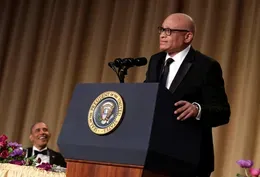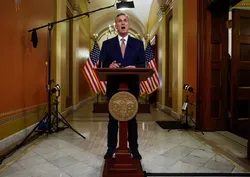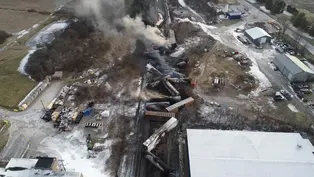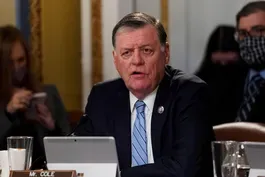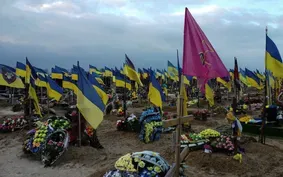
U.S. Deputy Secretary of State on status of war in Ukraine
Clip: 2/23/2023 | 7m 18sVideo has Closed Captions
U.S. Deputy Secretary of State on where Russia's war on Ukraine stands one year later
Friday is the first anniversary of Russia's full-scale invasion of Ukraine. One year on, after tens of thousands of lives lost, strong Ukrainian resistance and the U.S.-led coalition funneling billions in aid to Ukraine, where does the war stand? Amna Nawaz discussed that with Deputy Secretary of State Wendy Sherman.
Problems with Closed Captions? Closed Captioning Feedback
Problems with Closed Captions? Closed Captioning Feedback
Major corporate funding for the PBS News Hour is provided by BDO, BNSF, Consumer Cellular, American Cruise Lines, and Raymond James. Funding for the PBS NewsHour Weekend is provided by...

U.S. Deputy Secretary of State on status of war in Ukraine
Clip: 2/23/2023 | 7m 18sVideo has Closed Captions
Friday is the first anniversary of Russia's full-scale invasion of Ukraine. One year on, after tens of thousands of lives lost, strong Ukrainian resistance and the U.S.-led coalition funneling billions in aid to Ukraine, where does the war stand? Amna Nawaz discussed that with Deputy Secretary of State Wendy Sherman.
Problems with Closed Captions? Closed Captioning Feedback
How to Watch PBS News Hour
PBS News Hour is available to stream on pbs.org and the free PBS App, available on iPhone, Apple TV, Android TV, Android smartphones, Amazon Fire TV, Amazon Fire Tablet, Roku, Samsung Smart TV, and Vizio.
Providing Support for PBS.org
Learn Moreabout PBS online sponsorshipAMNA NAWAZ: Tomorrow is the first anniversary of Russia's full-scale invasion of Ukraine.
One year on, after tens of thousands of lives lost, strong Ukrainian resistance and the U.S. led coalition funneling billions in aid to Ukraine, where does the war stand?
Wendy Sherman is the deputy secretary of state, and she joins me now.
Deputy Secretary, thank you for joining us.
As you well know, one of the chief criticisms of the U.S. and Western response to the war in Ukraine has been too little too late, that they resisted sending things like Stingers and HIMARS, even tanks, out of fear of escalation, only to provide them later on anyway.
We know President Zelenskyy is now requesting these long-range missiles, the ATACMS system.
Every expert we have spoken to says this would let him hit further-away Russian targets, keeping Ukrainians safer.
Why is the Biden administration holding this request up?
WENDY SHERMAN, U.S. Deputy Secretary of State: Well, I think -- Amna, it's great to be with you this afternoon and talk with you and talk with your viewers.
President Biden at every step along the way has listened very closely to what President Zelenskyy has asked for.
And no doubt, if I was President Zelenskyy, I would ask for everything I could possibly think of, because this is very existential for Ukraine.
These are very tough decisions.
We look at our own readiness.
We look at our own stockpiles.
But we look at what the battlefield is and what we can provide.
And, yes, at every point along the way, one has to think about escalation, not taking us to a place I don't think Ukraine or anybody else wants to be.
I think the president has made incredibly wise and steady decisions.
I think his trip to Kyiv, his speech in Poland made it clear that the American people and the world, for that matter -- 141 countries stood with Ukraine this afternoon at the United Nations.
(CROSSTALK) AMNA NAWAZ: But, on this point, if I may, on this fear of escalation, that has been there from the beginning, and all of these weapons systems were provided anyway.
So, what is the -- what's the Russian response you're trying to avoid at this point?
They have already bombed civilian targets and hospitals and so on.
WENDY SHERMAN: Without a doubt, when Vladimir Putin wasn't winning and isn't winning on the battlefield, he's decided to try to freeze people to death, to abduct children and take them to Russia and try to -- quote, unquote -- "reeducate them" as Russians, horrifying acts that I think everybody listening just is astounded that this would happen in this day and age, so many echoes of history that are profoundly horrible.
But let me be clear that the United States has provided billions of dollars in security assistance to Ukraine.
We want to ensure that Vladimir Putin is held back from taking the most horrible steps that he could take, even beyond the horrible steps he's already taken.
(CROSSTALK) AMNA NAWAZ: When you say the most horrible, are you talking about a tactical nuclear weapon?
Is that the worst-case scenario you're trying to avoid?
WENDY SHERMAN: Well, it's not the worst-case scenario, but the worst-case scenario would also be invading other countries as well, believing that they belong to some fantasy of what a Russian empire should look like under Vladimir Putin.
But, certainly, we don't want, the world does not want Vladimir Putin to use what is considered to be a tactical nuclear weapon.
In my own view, having dealt with the issue of nuclear weapons over many years, every single kind of nuclear weapon, even if it is -- quote unquote -- "low threshold," is a very, very great risk to the world's security.
AMNA NAWAZ: I'd like to ask you about the recent warnings to China against providing lethal aid to Russia that we have heard from U.S. officials.
What does that mean?
What, in your view, constitutes lethal aid that China is considering providing?
WENDY SHERMAN: Well, we are very concerned that lethal aid means direct assistance to provide weapons to Russia.
And the administration has told the People's Republic of China directly that if, in fact, they do provide lethal aid to Russia, that there will be consequences.
And the PRC understands what that means.
AMNA NAWAZ: And would that be -- with China's provision of lethal aid, would that be an escalation that warrants a stronger U.S. response?
WENDY SHERMAN: I think it certainly will get a U.S. response if they provide such lethal aid.
And Vladimir Putin has been an aggressor nation.
Ukraine has been the victim here.
And the PRC should be standing with Ukraine, which is trying to uphold the principles of the U.N. charter that Xi Jinping says is so important to him.
AMNA NAWAZ: Deputy Secretary, I want to ask you about where we are as a nation, because we have some new poll numbers from "PBS NewsHour"/NPR/Marist poll that shows nearly a third of Americans think we are providing too much support to Ukraine.
And, of course, there's a big partisan divide.
That's a stronger sentiment among Republicans, 47 percent of whom think it is too much.
Does declining public support here at home make it harder to continue to fund Ukraine?
WENDY SHERMAN: Well, you're talking about a third of Americans who have said they think perhaps we're giving too much, but that means two-thirds of Americans believe that we should stand with Ukraine.
That's more than a simple majority.
So I think that's a very profound statement about the tremendous solidarity with Ukraine in this.
Look, everybody wants this to be over, no more so than the Ukrainian people, who are being frozen out of their homes, don't have electricity, civilians being killed by Iranian drones that have been given or sold to Russia.
AMNA NAWAZ: While I have you, Deputy Secretary, I want to ask you about Iran, because the International Atomic Energy Agency has said they have detected Iran has enriched uranium to 84 percent purity.
That is weapons grade.
What is the threshold for the U.S. to act to place new sanctions or to take any other kind of action?
WENDY SHERMAN: Well, I haven't seen the final assessment by the International Atomic Energy Agency.
And I will look forward to seeing the details of the assessment that I know they're currently making and what the basis of it is.
And then I'm sure that we will have consultations with Europe and with others before deciding how to proceed.
If indeed they have enriched as a matter of policy to 84 percent, that is extremely concerning.
AMNA NAWAZ: And would that trigger some kind of U.S. action, additional sanctions or something else?
WENDY SHERMAN: Indeed, we would have to decide what that means and what consequences are appropriate.
AMNA NAWAZ: That is Deputy Secretary of State Wendy Sherman joining us tonight.
Thank you for your time.
WENDY SHERMAN: Thank you.
Take care.
Abortion pills latest battleground over reproductive rights
Video has Closed Captions
Clip: 2/23/2023 | 7m 57s | Abortion pills become latest battleground over reproductive rights (7m 57s)
How Larry Wilmore's 30 years in TV have shaped comedy
Video has Closed Captions
Clip: 2/23/2023 | 7m 51s | How Larry Wilmore's 30 years in TV have shaped comedy and challenged traditional notions (7m 51s)
New poll shows where Americans stand on debt ceiling debate
Video has Closed Captions
Clip: 2/23/2023 | 4m 27s | New poll shows where Americans stand on debt ceiling debate, raising minimum wage (4m 27s)
NTSB releases preliminary report on Ohio derailment
Video has Closed Captions
Clip: 2/23/2023 | 3m 44s | NTSB releases preliminary report on Ohio derailment that led to toxic chemical spill (3m 44s)
Republican Rep. Tom Cole discusses debt ceiling debate
Video has Closed Captions
Clip: 2/23/2023 | 7m 44s | Republican Rep. Tom Cole discusses debt ceiling and issues facing a divided Congress (7m 44s)
Ukraine's fight against Russia forges new levels of unity
Video has Closed Captions
Clip: 2/23/2023 | 6m 8s | Ukraine's fight against Russia forges new levels of national unity a year into war (6m 8s)
Providing Support for PBS.org
Learn Moreabout PBS online sponsorshipSupport for PBS provided by:
Major corporate funding for the PBS News Hour is provided by BDO, BNSF, Consumer Cellular, American Cruise Lines, and Raymond James. Funding for the PBS NewsHour Weekend is provided by...

